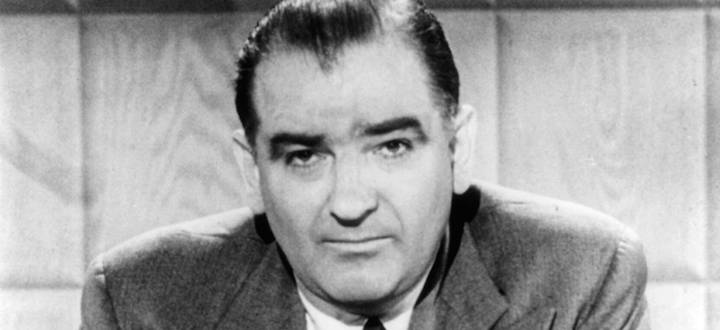
Photo: Wikimedia Commons
In February 1950, McCarthy, a Republican senator from Wisconsin, launched a massive campaign against alleged Communists and Soviet agents working for, and perhaps spying on, the U.S. government. In Senate hearings stretching across much of the first half of the 1950s, he accused numerous U.S. government employees, including many in the State Department, of being Communists or even agents of Soviet Intelligence. He was bitterly opposed by powerful members of the Senate, by numerous high-ranking officials within both the Truman and Eisenhower administrations, and by the overwhelming preponderance of the press corps. He was finally censured by the U.S. Senate in December 1954 and died, possibly of effects of alcoholism, several years later. He was forty-eight.
The demonizations, then and now, involve charges that McCarthy lied, badgered, intimidated, victimized innocents, and fanned the flames of a massive anti-Communist hysteria. A typical account of his methods is provided by History.com’s “This Day in History,” which claims, “In widely publicized hearings, McCarthy bullied defendants under cross-examination with unlawful and damaging accusations, destroying the reputations of hundreds of innocent officials and citizens.”1
The pejorative term “McCarthyism” was coined by his critics to denote “The practice of making accusations of disloyalty, especially of pro-Communist activity, in many instances unsupported by proof or based on slight, doubtful, or irrelevant evidence.”2
Even historians who investigate and expose Soviet espionage penetration of the U.S. government claim that “McCarthy’s charges were, in fact, based on thin evidence” and that he “use[d] anticommunism for partisan purposes.”3
Finally, some FBI agents who actively pursued Soviet spies join in the chorus of criticism: “I . . . was more interested in countering the activities of the Soviet KGB and GRU. . . . McCarthy’s star chamber proceedings, his lies and overstatements hurt our counterintelligence efforts.”4
But evidence accumulated from a variety of sources—including Soviet archives—since the end of the Cold War in the early 1990s shows that McCarthy’s charges were, in numerous cases, neither false nor hysterical—but correct.
It is time to examine the new evidence objectively and to reassess McCarthy, his activities, and Soviet espionage penetration of the U.S. government. In so doing we perform an act of justice to a wrongly maligned man, gain greater knowledge of the Cold War’s early days, and sound a warning regarding possible espionage within and against the U.S. government by current or future enemies.
To reassess McCarthy accurately requires knowledge of (1) the murderously evil nature of Communism, (2) the massive Soviet espionage penetration of the U.S. government, and (3) the specifics of numerous cases regarding McCarthy’s efforts to expose that espionage.
Regarding the first of these, readers are encouraged to read my recent essay, “The Socialist Holocaust and its American Deniers,”5 and its sources, especially The Black Book of Communism, which provides data taken, in part, from the files of numerous former Communist regimes, including the Soviets. Suffice it to say here that, worldwide, Communism has been responsible for the murder of one hundred million innocent civilians.6 More, it has done so in strict adherence to its cardinal principle: Because members of the owning class cruelly exploit members of the working class, the former must be expunged in ruthless class warfare.
Items two and three—Soviet espionage penetration of the U.S. government and details regarding McCarthy’s efforts to expose it—are the focus of this essay.
Soviet Espionage Penetration of the U.S. Government
The Soviets targeted the Communists’ main ideological enemy, the capitalist United States, even during World War II, when the two nations were supposedly allied in a death struggle against fascism. Soviet agents achieved widespread penetration of the American government, spying, stealing secrets, ultimately supplying data enabling Stalin’s blood-drenched regime to develop an atomic weapon years earlier than otherwise.The story reads like a spy thriller. . . .
No comments:
Post a Comment